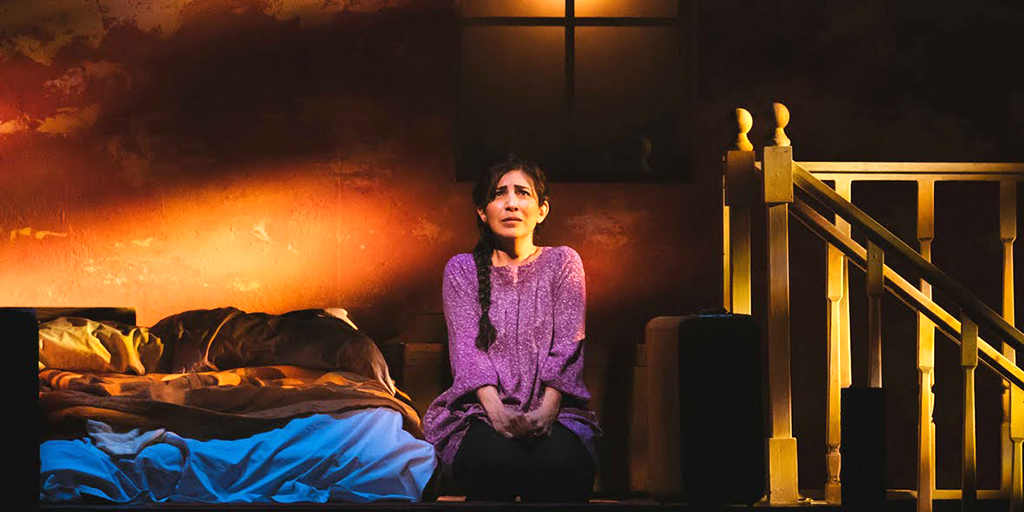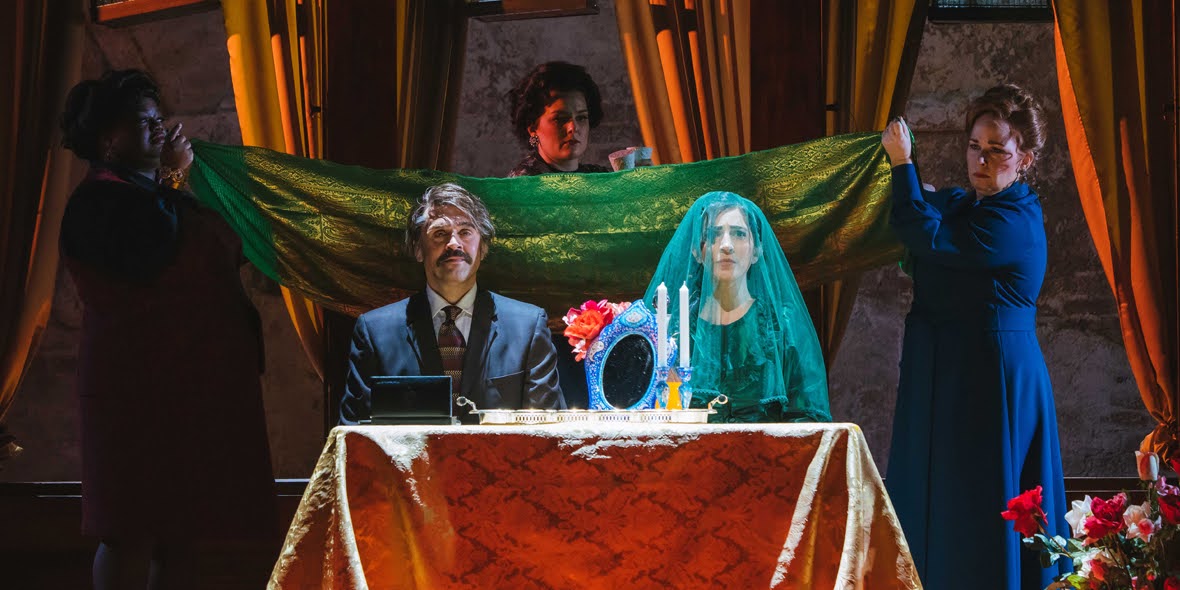By Mahlon Meyer
NORTHWEST ASIAN WEEKLY
How do you survive abuse? Domestic? Cultural? Geopolitical? Gender?
That is a question raised by the modern opera, “A Thousand Splendid Suns,” running at the Seattle Opera.
“We died a little so that we may live,” sing the main characters repeatedly.
Indeed, the opera, which is based on the novel of the same name, might more aptly be called, “A Thousand Splendid Deaths,” although that would bastardize the line of the poem from which the story takes its title.
Still, the drama follows two women, driven together by chance, as they toil to survive an abusive and crushing patriarchal culture, an imperialistic invasion, warlord fighting, and finally the radical theocracy of the Taliban.
(Spoiler alert—please skip the following review if you intend to see it and haven’t read the book.)
All this culminates in a souped-up version of an apotheosis of the main character as she gives her life for the younger woman she has adopted as her daughter.
The moment in the opera, which comes like a flaming catharsis at the very close of the three-hour long saga, reveals the indelible power and rawness of women’s struggles everywhere, not to mention in as battered and war-weary a country as Afghanistan.
At the same time, however, it might raise a few eyebrows for the implacable force that leads the main character, Mariam, who is introduced as a harami—or illegitimate child—to find her only redemption in offering her own life. Not to question the logic of the book, but haven’t we had enough of movies, plays, literature, and opera in which the only way out for a woman is death?
From Anna Karenina to the Chinese silent movie, “The Goddess,” why do women always have to bite it in the end?
Nevertheless, the moment of her death is so moving, I felt my nose clog up and my breath sort of stick in my throat.
Kneeling there, before a small army of Taliban soldiers, who are about to execute her for killing her husband (thus saving the life of his younger wife, whom he was in the act of strangling), Mariam throws her head back, smiling. Her robes are lit by an unearthly, piercing light that comes to dominate the whole stage (the audience was sitting in mute terror and awe; I was holding back my sobs).
It is an ethereal, transcendent moment that you don’t often see or experience anywhere. The power of live theater is revealed here. Other presentations that try to evince a similar feeling of religious awe and ecstasy—-one thinks of the movie, “The Mission,” for instance—pale in comparison.
As Miriam sings her last, like a subtle swan song of all delicate yet courageous and resilient people, she captures and sweeps up the audience as if we’ve been sucked into a moving cloud of loss and self-realization.
After the Taliban soldier who is tasked with executing her asks her in strangely gentle language if she is ready to die, calling her “mother,” her assumption of—what else can we call it but—goddesshood is so stunning and emotionally commanding it gives new meaning to the words “emotional” and “riveting.”
It is a mixture of sorrow and pity and greatness and fulfillment—perhaps that is the exercise of courage—as we hear her final aria in which she explains that she, an unwanted, cast-aside harami, has found fulfillment in learning to love and be loved—something to live for—even as she dies.
The stagecraft and the power of the music, which combines punches of western music worthy of a Sibelius or a Stravinsky, punctuated by Hindustani motifs, make the experience a wall of unbelievable light and sound come throbbing off the stage with Mariam at the center.
At many times during this opera, I was suffocating and trying not to sob—mostly in the second act, where the plot complications come to fruition.
Still, I could not turn off the critic in me. I questioned whether the novel was written—and the opera developed—with a western audience in mind.
One sees similar issues in evaluating works done by Chinese filmmakers of past decades, for instance, who knew their films would never be shown in their own country. Do they cater to stereotypes about their own culture or country?
Why is it, for instance, in this case, that the story shows only the Soviet Invasion of Afghanistan peripherally, as rockets and bombs exploding offstage?
Why are the Taliban, as brutal and ruthless as they are reported to be, singled out as the personification of misogynistic cultural traditions? Why is there no real explanation or evaluation of the global forces that encouraged their rise?
At the same time, those who visited and worked in Afghanistan before the Soviet Invasion, have said how different the country was then.
I happened to see the show with my father, who worked for UNESCO in the 1970s in Afghanistan for half a year, helping the country build its first broadcasting network.
He described once visiting a poor village that owned a single chicken. Despite all his protestations to the contrary, the villagers insisted on slaughtering the chicken and serving it to him, since he was a guest.
Decades later, in my own marginal encounter with Afghanistan, as a Newsweek correspondent based in Asia, in the wake of 9-11, we were assigned to scour our stomping grounds for any trace of Osama bin Laden.
With the help of a Filipino journalist, I found a member of a Muslim army deemed terrorist by the State Department who described to me a vast training ground of rocket propelled grenades and cement bunkers, at the end of which bin Laden himself would come out and take names and addresses. This was allegedly in Afghanistan.
How rapidly the western imagination and media change their depiction of foreign countries.
Despite all this, the universal theme of the opera is one that explains its riveting hold on the audience.
It is, perhaps, about women finding solidarity despite apparent rival interests—a theme we could certainly learn from here.
Mariam is sold off—I mean, married off—at 15 to a much older man in the city—Rasheed—whose abusive ways are magnified when she, stress-ridden and alone, fails to bear him children.
Laila comes into the household after her parents are killed when a bomb destroys their house just as they are preparing to flee Kabul for Pakistan, where Laila’s young lover has fled, promising to return.
At first, the two women fight over such oddities as the absence of a wooden spoon.
(Laila agreed to marry Rasheed, it turns out, because she was pregnant with her lost lover’s son, is now convinced that he is dead, and realizes the only chance her child will have is as the putative child of the new man).
But relatively soon after the birth of her second child, Laila resists sleeping with Rasheed, who has now begun to abuse her as well.
When Rasheed turns his wrath on Mariam, Laila, however, agrees to have sex (one might say, be raped by) her husband in order to prevent his beating Mariam.
As they depart upstairs, and shadows hang over the bedroom, Mariam for the first time ever turns to comforting Laila’s daughter.
Laila, upon discovering this, is overjoyed and enraptured. She vows to call Mariam her mother and makes plans for the three of them to escape.
That fails.
The opera culminates when the husband, now older but still terrible, tries to strangle to death Laila after she is caught greeting her lost lover, who it turns out was not dead after all, but tricked into carrying drugs and imprisoned.
Mariam, mustering up her courage from despair, strikes him on the head with a shovel as the music blazes an accompanying beat until he is dead.
She then revives Laila.
But she insists that she must stay behind to take the blame for the murder—to allow Laila and her daughter and her returned lover to flee.
Some ending!
Again, if you like the paradox of an opera that is both empowering to women suffering defeat after defeat, then banding together for victory of sorts, yet one in which the heroine is actually executed with a Kalashnikov rifle on stage, then go see “A Thousand Splendid Suns.”
I don’t think I could endure the splendor and concentration of emotional intensity another time.
To purchase tickets for the two remaining shows on March 8 and 11, go to: https://www.seattleopera.org/on-stage/2023-a-thousand-splendid-suns/
Mahlon can be contacted at info@nwasianweekly.com.






